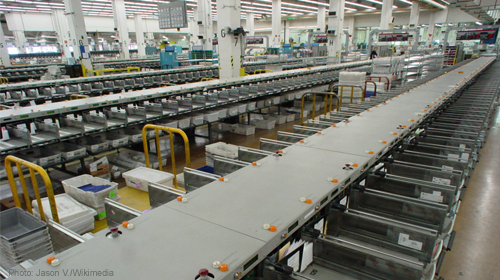
Dozens of tired, bedraggled men line up in shackles to plead guilty en masse. A judge claims his personal best is sentencing 70 people in 30 minutes: an average of twenty-five seconds per person to review the charges, hear his or her plea, and hand down a sentence.
No, this is not Egypt or Russia. It's the United States, in federal courthouses along the Southwest border.
What's driven our courts to adopt such assembly-line justice? Operation Streamline, a "zero tolerance" program that began under Bush and expanded under Obama.
Traditionally, federal authorities handled illegal immigration through the comprehensive enforcement scheme available under civil immigration laws. That enforcement scheme—which has deported about 2 million people over the past five years—already results in significant unfairness. But under Operation Streamline, authorities both process apprehended migrants for deportation and refer them for criminal prosecution for crossing the border.
Last week, the Pew Research Center hinted at the impact of Operation Streamline when it reported that felony convictions for unlawfully reentering the United States accounted for 26% of the federal convictions tracked by the U.S. Sentencing Commission in 2012—a 13-fold increase over two decades ago, when they accounted for just 2% of the total. But as stunning as this number is, it's less than half of the story. There's been an even bigger explosion in misdemeanor convictions for unlawfully entering the country (which are not tracked in the Sentencing Commission database examined by Pew).
Together, misdemeanor and felony border-crossing prosecutions now dominate federal dockets. In 2013, 80% of the federal criminal cases filed in Arizona and New Mexico, 83% of the cases filed in western Texas, and 88% of the cases filed in southern Texas were for illegal border-crossing. Nationwide, one out of every two cases filed by federal prosecutors was for border-crossing. (These stats are compiled by Syracuse University's TRAC project.)
In a better world, criminal justice resources would be allocated to the most serious, high priority crimes. Instead, federal prosecutors are spending scarce time and money on the unnecessary criminalization of immigration.
These prosecutions are also swelling the flow of immigrants into jails and federal prisons. As the Justice Department stated in its FY2015 budget request for federal pretrial detention: "Nowhere has the impact of changing law enforcement priorities on detention expenditures been more observable than with the implementation of zero tolerance immigration enforcement policies along the [Southwest Border]." As the budget request explains, the number of people annually booked into federal custody for immigration offenses has more than doubled since the start of Operation Streamline, hitting nearly 98,000 in 2013. (To give a sense of how big that number is: It's more than three times the number of people that were booked for federal drug offenses the same year.)
Political leaders on both sides of the aisle are starting to wake up to the unnecessary fiscal and human costs of mass incarceration. But immigration remains a blind spot for too many. Rather than repeat the mistakes of the ongoing War on Drugs by unnecessarily criminalizing immigrants, we need to end our national addiction to over-criminalization and over-incarceration in all their permutations.
Learn more about immigration detention and other civil liberty issues: Sign up for breaking news alerts, follow us on Twitter, and like us on Facebook.

